
O Signatera™ é um teste personalizado de DNA tumoral circulante (ctDNA) usado principalmente para monitorar o câncer em pacientes que já foram diagnosticados.
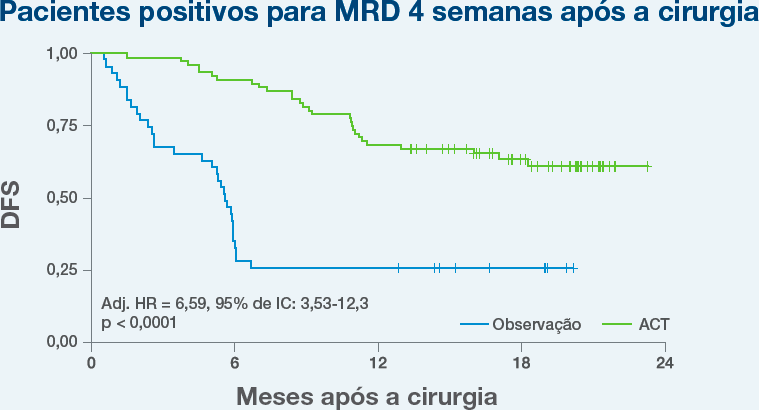
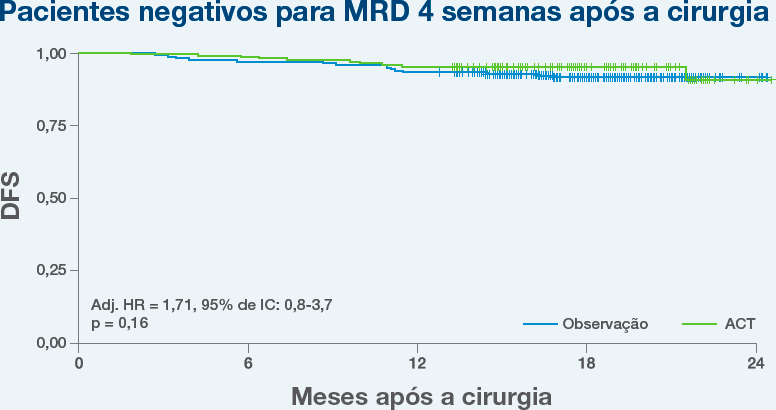

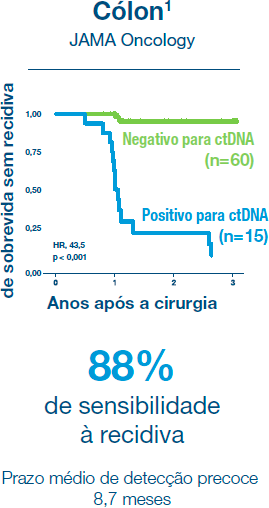
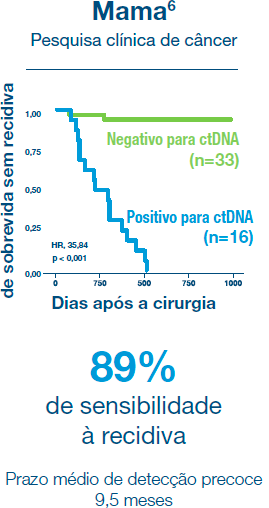
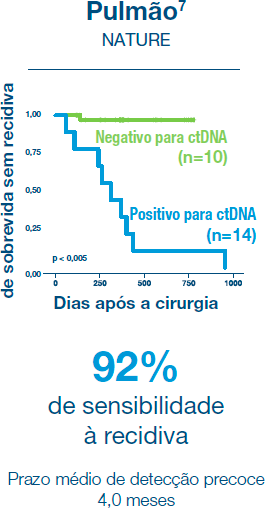
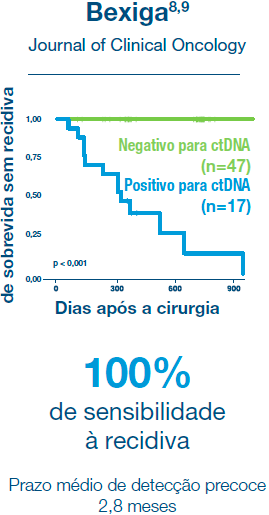
1. Reinert T, Henriksen TV, Christensen E, et al. Analysis of Plasma Cell-Free DNA by Ultradeep Sequencing in Patients With Stages I to III Colorectal Cancer. JAMA Oncol. 2019.
2. Sinicrope FA, Foster NR, Thibodeau SN, et al. DNA Mismatch Repair Status and Colon Cancer Recurrence and Survival in Clinical Trials of 5-Fluorouracil-Based Adjuvant Therapy. J Natl Cancer Inst. 2011;103(11):863-875.
3. Aoyama, Oba K, Honda M, et al. Impact of postoperative complications on the collorectal cancer survival and recurrence: analyses of pooled individual patients’ data from three large phase III randomized trials. Cancer Med. 2017;6(7):1573-1580.
4. Yothers G, O’Connell MJ, Lopatin M, et al. Validation of the 12-gene colon cancer recurrence score in NSABP C-07 as a predictor of recurrence in patients with stage II and III colon cancer treated with fluorouracil and leucovorin (FU/LV) and FU/LV plus oxaliplatin, J Clin Oncol. 2013;31(36):4512-4519.
5. Kotani D. et al., Molecular residual disease and efficacy of adjuvant chemotherapy in patients with colorectal cancer, Nature Medicine v29 Issue 1 Jan 2023
6. Coombes RC, Page K, Salari R, et al. Personalized Detection of Circulating Tumor DNA Antedates Breast Cancer Metastatic Recurrence. Clin Cancer Res. 2019;25(14):4255-4263.
7. Abbosh C, Birkbak NJ, Wilson GA, et al. Phylogenetic ctDNA analysis depicts early-stage lung cancer evolution. Nature. 2017;545(7655):446-451.
8. Christensen E, Birkenkamp-Demtroder K, Sethi H, et al. Early Detection of Metastatic Relapse and Monitoring of Therapeutic Efficacy by Ultra-Deep Sequencing of Plasma Cell-Free DNA in Patients With Urothelial Bladder Carcinoma. J Clin Oncol. 2019;37(18):1547-1557.
9. Data on file
10. Japanese Society of Medical Oncology Guidelines, October 2022.
Considere fazer este teste quando há:
Use Signatera™ no contexto neoadjuvante para identificar e dar suporte a uma abordagem de “observar e esperar” ou não cirúrgica em determinados pacientes.
Use o Signatera™ após a cirurgia para avaliar a necessidade de quimioterapia adjuvante e potencialmente evitar tratamento desnecessário.
Use Signatera™ junto com testes CEA e de imagem para detectar a recorrência mais cedo.
O Signatera™ permite monitoramento em tempo real da dinâmica do ctDNA para avaliação precoce e sensível da resposta ao tratamento.
Exoma Tumoral
A metodologia utilizada para este é:
Sangue: Não necessita jejum.
Biópsia: Em Bloco de Parafina ou Lâmina.
Exoma Tumoral – Até 40 dias corridos
Monitoramento – Até 12 dias corridos
Pedido médico.
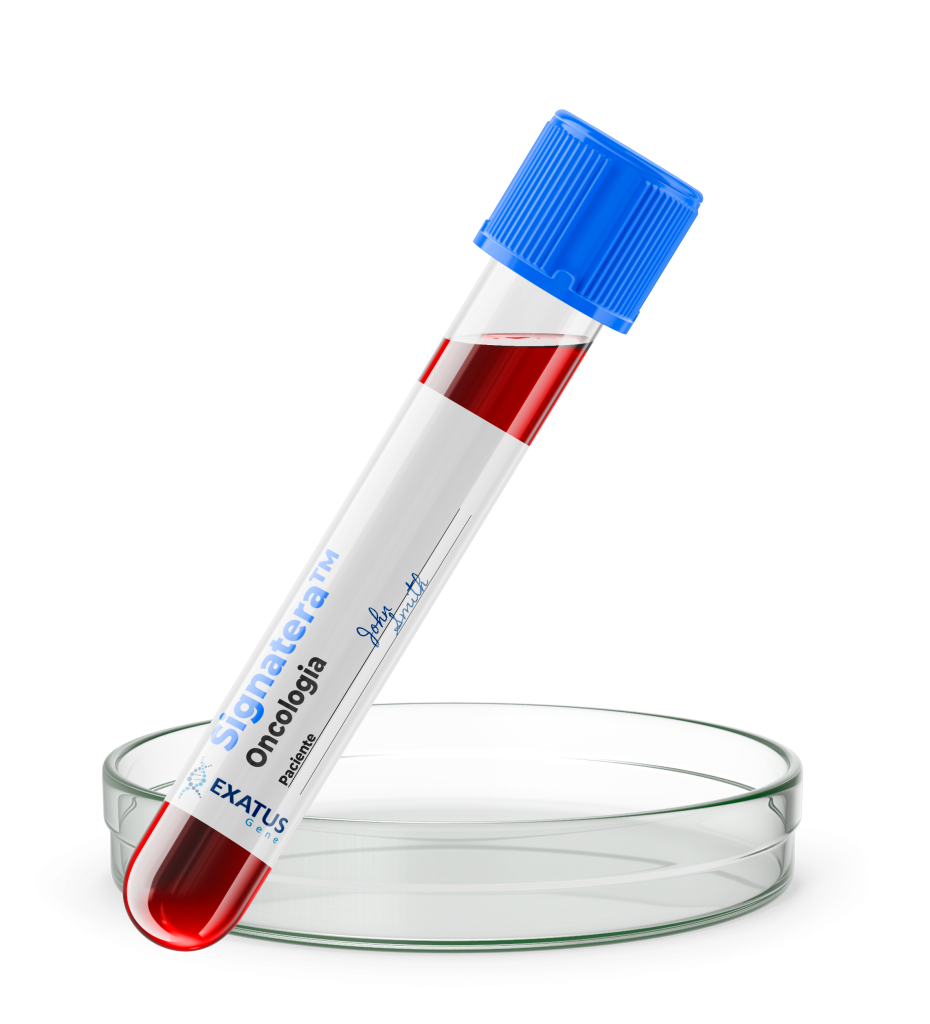
| Tipo | Descrição |
| Técnica | ctDNA |
| Acurácia | Ao rastrear apenas variantes específicas do tumor, a sensibilidade é maximizada com um baixo limite de detecção (LOD) de 0,01% de frequência alélica variante (VAF). Além disso, o Signatera™ filtra a hematopoiese clonal de mutações de potencial indeterminado (CHIP) para reduzir muito os resultados falsos-positivos. |

Unidade Matriz
Rua Bento Gonçalves, 59, Sala 802 — Centro, Marau, RS — 99150-000
Unidade Porto Alegre
Rua Gomes Jardim, 301 , Sala 918/909 — Santana, Porto Alegre, RS — 90620-130